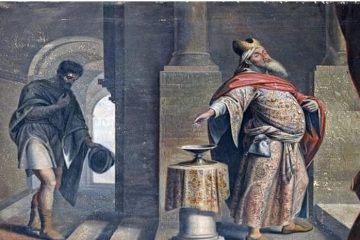Protopresbyter Georgios Dorbarakis
‘Illumined, brethren, by the resurrection of Christ the Savior and having reached the mid-point of the Lord’s feast, let us keep God’s commandments assiduously; that we may be worthy to celebrate the Ascension and enjoy the presence of the Holy Spirit (Doxastiko, Lauds, Saturday of Mid-Pentecost).
According to the hymnographer, the Lord’s resurrection is the event which brought God’s light into human existence. Because of our fall into sin, we lost our fellowship with God and so our glory and light from our relationship with him were also lost. The murk and darkness of our passions clad us in a most tragic fashion. Adam’s lament, as the Church renders it on the Sunday of Cheese-fare, expresses this wretched reality. The advent of the Son of God into the world as a human person, his incarnation, is what reversed everything. Everything fell back into place: the Lord took away the sin of the world, he abolished it on the cross, he put death to death and, with his resurrection, demonstrated in the most powerful manner that, henceforth, ‘life prevails’ and that the light of God inundates the universe again. ‘Now all things are filled with light: the heavens, the earth and the nether world’. Since the Lord’s resurrection, the sun’s been shining continuously; humankind and the whole of creation have felt its beneficial rays; the darkness has been dispelled. Of course, with one proviso: people have to want Christ in their life. This is the majesty of our God: even though he’s all-powerful and nothing can oppose his will, he restricts himself, seeking the voluntary obedience of the creature he made in his image and likeness. In other words, faith is the necessary agreement, as we say, for all the riches of his divinity to flow into our being. And it’s this which shows the value of human freedom. To make a simile, the sun is now shining even more brightly, but people have to open their eyes in order to see the beauty of the light. God doesn’t force us.
For us, this faith ‘agreement’ is that we share in the Lord’s cross. When we say that we believe in Christ, it means that we accept his word as the way we should live, because, of course, for Christians faith isn’t a matter of mere theoretical acceptance. And following Christ on the basis of his commandments is our cross, because we’re called upon to ‘crucify’ our reason as our absolute criterion, to struggle against our reprehensible passions, our egotism and our pride in all things that attract us and charm us into attachment to the fallen world of sin. We’re asked to orientate ourselves continuously, without ceasing, towards the love of God and other people, in particular towards those we think of as enemies, because this is the defining feature of our Christianity. In this way, the cross and the resurrection co-exist in believers, and so the joy and the light of the resurrection come about because of the pain of crucifying the passions. ‘For, behold, through the cross, joy has come into the whole world’.
To return to the tropario. For the hymnographer, illumination from the resurrection comes from the degree to which a believer is continuously committed to living in accordance with the Lord’s commandments. And what does he emphasize? That the faithful must continue to observe the Lord’s commandments assiduously if they want to celebrate his ascension and the coming of the Holy Spirit in a worthy manner. This is a very important message, because it emphasizes that a feast in the Church, particularly one of the Lord’s, involves increased preparation. On a feast day, we can’t just turn up at church ‘any old how’, as we say, to sit and listen to what’s being said. That’s unbecoming to genuine Christian faith and this is perhaps the tragedy of many of us who consider ourselves to be Christians. The hymnographer helps us: we celebrate the feast properly when we open our heart to God and other people. If we don’t, then we’re impervious to God’s grace, which is why you see people going into church and coming out just as they were before- strangers then and strangers now.
The Ascension and Pentecost demand people who are close to their spirit. There’s only one way we can become ‘related’ to Christ: by observing his holy commandments, which activates the raiment of holy baptism. And this raiment is Christ himself. Then we immediately realize that every feast, particularly a great one, brightens our existence in Christ to the greatest possible extent. Christ shines within us.
Source: pemptousia.com




0 Comments